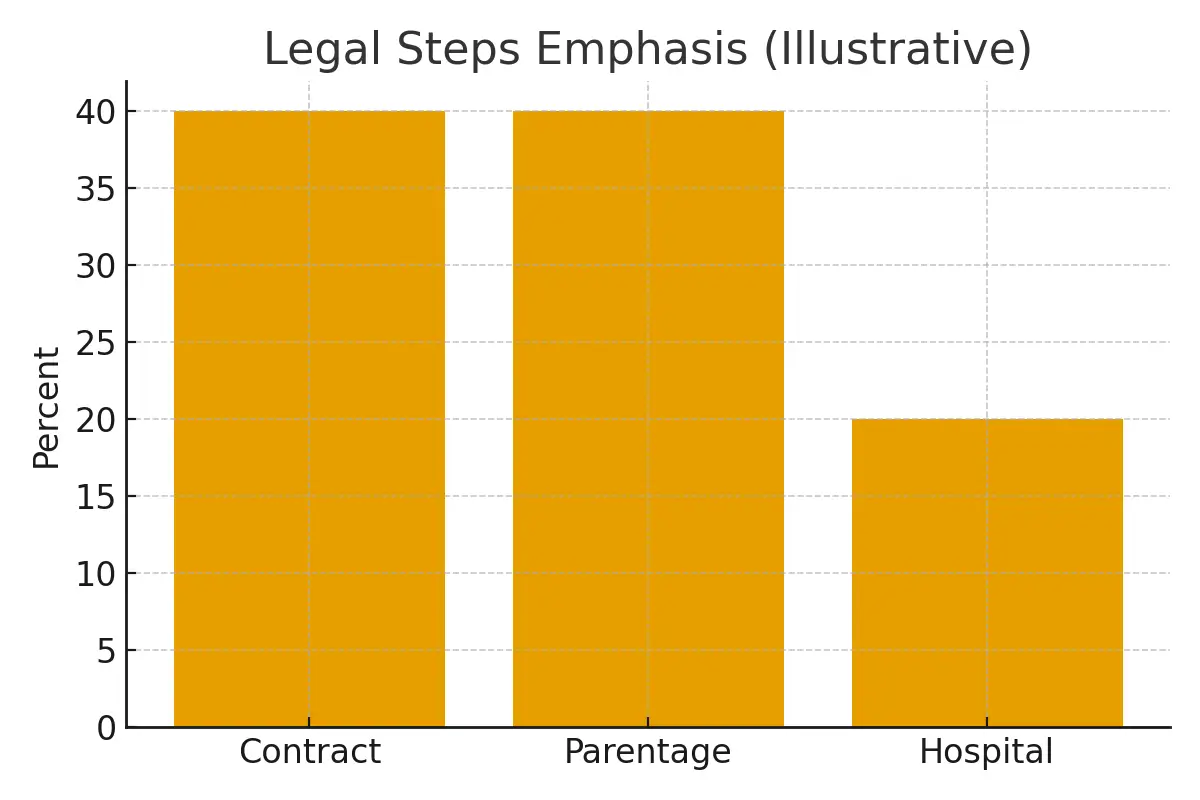
When building a family through surrogacy, egg donation, or sperm donation, legal contracts are not just paperwork—they’re the framework that protects all parties involved. This guide explains which clauses matter most, where hidden pitfalls occur, and how smart choices can affect timelines, budgets, and emotional security.
What It Is
Legal contracts in family building outline rights, responsibilities, and protections for intended parents, surrogates, and donors. They clarify parentage, financial terms, medical decisions, and dispute resolution. The right clauses can prevent misunderstandings and keep your journey on track.
Who It Helps
- Best fit: Intended parents working with a surrogate or donor, especially across state or international lines.
- Other paths: Families using only their own gametes/gestational carrier within jurisdictions with clear parentage laws may face fewer legal hurdles.
Step-by-Step
- Consult a reproductive law specialist – not a general lawyer.
- Draft the agreement – cover compensation, medical decisions, and contingency plans.
- Independent legal review – both sides (intended parents and surrogate/donor) must have separate counsel.
- Finalize & notarize – before medical procedures begin.
- Secure parentage orders – often required for birth certificates and citizenship.
Pros & Cons
Pros
- Legal clarity protects all parties
- Prevents disputes that can delay or block parentage
- Defines clear financial expectations
Cons
- Adds legal costs upfront
- May extend timelines if negotiations stall
- Complex across international jurisdictions
Costs & Logistics
- Attorney fees: Range widely depending on state/country complexity.
- Court filings & parentage orders: Additional legal costs.
- International cases: Require dual legal review in both countries.
- Tip: Budget for translation, notary, and travel-related filings if working abroad.
What Improves Outcomes
- Choosing lawyers who specialize in reproductive law
- Finalizing contracts before medical steps (retrieval, transfer)
- Using escrow accounts to manage payments securely
- Building contingency clauses for medical or emotional complications
- Aligning legal steps with clinic calendars to avoid delays
Case Study
A couple skipped hiring a reproductive law attorney and used a general lawyer. Later, their surrogate’s state required a pre-birth order the lawyer didn’t anticipate. This caused a six-month delay and additional legal fees. With specialized planning, this could have been avoided.
Mistakes to Avoid
- Using a non-specialist lawyer
- Starting medical procedures before contracts are signed
- Overlooking international differences in parentage laws
- Failing to budget for extra filings or translations
- Relying only on verbal agreements with donors or surrogates
FAQs
Q. Why can’t I just use a regular family lawyer?
Ans : Because reproductive law is highly specialized. General lawyers often miss clauses that affect parentage rights, medical authority, or international recognition.
Q. Do contracts need to be finalized before IVF or transfer?
Ans : Yes. Most clinics will not proceed without signed agreements, as this protects both intended parents and surrogates/donors.
Q. What’s the difference between a pre-birth and post-birth order?
Ans : A pre-birth order establishes parentage during pregnancy, while a post-birth order is issued after delivery. Which one applies depends on the state or country.
Q. How much do legal contracts usually cost?
Ans : In the U.S., $3,000–$12,000 is typical for surrogacy contracts, plus additional fees for court filings or international work. Costs vary by complexity.
Q. If we’re working internationally, do we need lawyers in both countries?
Ans : Yes. Each jurisdiction may have unique rules on parentage, citizenship, and recognition of donor agreements. Dual legal review prevents future disputes.
Next Steps
- Book a free 15-min legal consult
- Upload your draft contract for review
- Request a cost breakdown tailored to your case
Clear, protective contracts are the foundation of a smooth LGBTQ+ family-building journey—saving you time, stress, and money in the long run.

Dr. Kulsoom Baloch
Dr. Kulsoom Baloch is a dedicated donor coordinator at Egg Donors, leveraging her extensive background in medicine and public health. She holds an MBBS from Ziauddin University, Pakistan, and an MPH from Hofstra University, New York. With three years of clinical experience at prominent hospitals in Karachi, Pakistan, Dr. Baloch has honed her skills in patient care and medical research.





